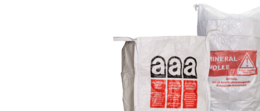Material Information
Sheet steel
Sheet steel is recognized as an environmentally friendly packaging material that is 100% recyclable without any loss of quality, regardless of the number of times it is recycled. In the field of chemical and technical products, sheet steel packaging ensures a high level of safety by offering complete protection against external factors such as dirt, pests and bacteria. It also protects against environmental elements such as moisture, oxygen, light and foreign odors that could otherwise affect the quality of the contents. Predominantly used in chemical-technical packaging, sheet steel is used in the manufacture of various containers, including cans (flat or composite), buckets, hobbocks, and drums. These containers are used for a wide range of substances, including chemicals, paints, varnishes, building protection products, mineral oil products, adhesives and binders, as well as cleaning, care and maintenance products. Steel packaging is particularly valued for its exceptional safety features, being both secure in transit and impact resistant, making it the preferred choice for hazardous goods packaging.
Applications:
Sheet steel is a versatile material that is used in various industries due to its strength, durability and formability. Below are some applications of sheet steel in the industries listed:
- Paints and varnishes: sheet steel is used as a packaging material for paints, varnishes and coatings. It is particularly suitable for the manufacture of cans and containers that protect these products and extend their shelf life.
- Chemical products: In the chemical industry, sheet steel is used for the storage and transportation of chemical products such as acids, alkalis and solvents. It is also used for the construction of pressure vessels, reactors and heat exchangers.
- Food and beverages: Sheet steel is used to manufacture food packaging, cans and beverage cans. It is also an important component of food processing equipment, such as conveyor belts, mixing containers and pasteurization systems.
- Pharmaceutical products: In the pharmaceutical industry, sheet steel is used for the manufacture of packaging such as tablet containers and ampoules. It is also used for the construction of clean rooms and for the manufacture of equipment for tablet production, fermentation tanks and other process equipment.
- Building materials, production and trade: Sheet steel is used in the building materials industry for the production of roof and wall panels, façade cladding, profiled sheets and steel beams. It is also used in the manufacture of modular and prefabricated buildings.
- Waste disposal/recycling: In the waste disposal and recycling industry, sheet steel is used in the manufacture of waste containers, waste compactors and other waste disposal equipment. It is also used in the construction of waste treatment and metal recycling facilities.
Advantages / Sustainability:
- Recyclability: One of the biggest advantages of sheet steel is its recyclability. Steel is a fully recyclable material that can be reused without any loss of quality. This means that used steel can be used as a raw material for the production of new sheet steel, reducing the need for primary raw materials and CO2 emissions in steel production.
- Durability: Sheet steel is a durable material that has a long service life in many applications. This longevity means that less material needs to be replaced and disposed of, reducing both environmental impact and maintenance costs.
- Energy efficiency: Modern technologies and processes in steel production have improved energy efficiency in the manufacture of sheet steel. This leads to a reduction in energy consumption and associated emissions compared to other materials.
In summary, sheet steel is recognized for its exceptional versatility and robustness, making it a fundamental material across various industrial sectors. Its notable strength, enduring quality, and ease of formability render it ideal for applications in packaging, construction materials, machine parts, and plant components. The extensive application of sheet steel across diverse industries underscores its vital role as an essential and irreplaceable material in today's industrial framework.








